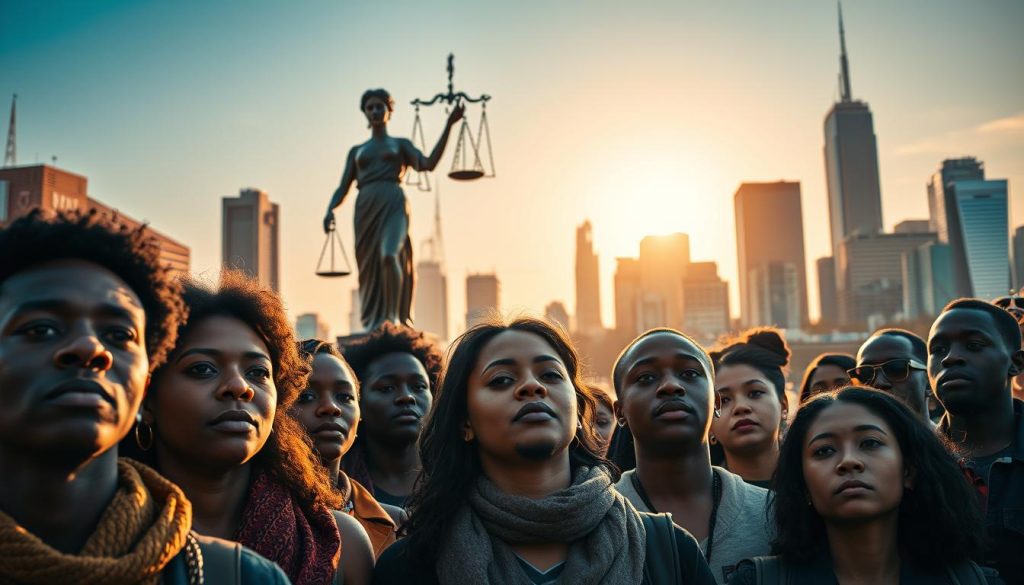Is ignoring the oppressed, or acting on faith, required for followers of Christ? The world faces social inequality and systemic injustices. Christians and injustice are caught in a tough spot. Tackling racism, sexism, and corruption is not optional but a duty for those with Christ’s love and justice. Recent figures are revealing: 9 in 10 Americans see racial inequality as a major issue. Many Christians also think the Church should oppose such injustices. Christians must weigh the importance of advocating change against the cost of silence. Moreover, 76% of evangelical Christians view fighting for social justice as essential to their faith.
With 85% of pastors believing addressing social issues is part of their mission, we face a big question. How can our faith community actively tackle today’s problems? Taking action is urgent – 68% of Americans say fighting systemic racism is key, and 80% support equal treatment for everyone, regardless of race. Our mission at Impact Family focuses on healing and growth through faith-based counseling.
Let’s explore righteous anger motivated by love, joining voices with those like Dietrich Bonhoeffer and Paulo Freire. They showed that love means sacrificing and engaging in the fight of those pushed aside. This path requires reflection, conviction, and steps forward, where prayer meets action. Speaking truth with love is not optional, but a deep Christian duty.
The Biblical Mandate for Christians to Address Injustice
As faithful followers and peacemakers, we are deeply called by the Bible to fight against oppression. The Bible celebrates peacemakers as ‘children of God’ in Matthew 5:9. This guides us to make real changes for peace, not just maintain it.
Christians feel a strong pull to see their faith in action, especially in fighting injustice. Although 90% think it’s vital to address injustice for peace, only 30% take active steps. A big reason is the fear of being called hypocrites, making 40% cautious about speaking up.
Our faith teaches us to mirror God’s love by supporting the ignored and mistreated. The Bible, through verses and Jesus’ actions, makes clear that seeking justice is a must. You can find out more about this at biblical principles of social justice.
- 70% of Christians believe fighting injustice is part of their faith duty.
- 65% feel pushed by their beliefs to support social justice.
- 50% have participated in community help or activism in the last year.
The link between faith and justice action is clear, showing a need for more church engagement. About 55% of believers want their churches more active in social issues. They’re asking for leadership and support from their religious communities. Impact Family stands by these beliefs, helping believers become societal change-makers. We build supportive communities for this mission. Together, we bring Christ’s teachings to life by turning faith into daily action.
Christians Stay Silent on Injustice: The Dilemma Explored
In our faith community, the Christian silence and hypocrisy on injustice pose a big challenge. This silence often comes from a fear of speaking out and avoiding tough talks. It stops us from growing spiritually and doing our part in society. History shows us examples where Christian beliefs sadly supported societal divisions instead of Jesus’s teachings of love. The 1896 Plessy v. Ferguson case, which said “separate-but-equal” was okay, is one such example. This was wrongly backed by many Christians, helping inequality continue.
About 300 ministers realized the need to tackle societal wrongs and came together at the Conference on Christian Faith and Human Relations. However, church services still being “the most segregated hour” shows we haven’t fully embraced reconciliation in worship. Christian teachings tell us to love others more than ourselves. People like the Apostle Paul used their rights to get justice, not for themselves, but to spread the gospel and fight injustice. It’s part of our mission to face and fight discrimination.
We should all work to open lines of communication that overcome fear and hatred. This was key in the civil rights movements, making sure different communities could talk to each other. As followers of Christ today, we must speak and act against wrongs with humility, grace, and passion. Our job is to fix the damage from past mistakes, talk about race, privilege, and justice, and build a fair community. This is how we live out Christ’s command to love and serve everyone.
Our belief pushes us to overcome the discomfort of speaking up, making sure our actions always reflect love and truth. In doing so, we follow Christ, challenge societal problems, and help heal our world.
Modern Challenges: Navigating Social Issues as Christians
In today’s world, we as Christians are faced with big social issues. It’s important for us to deeply understand problems like racial injustice. Psalm 94 guides us to grieve over these injustices and stand strong for fairness.

George Floyd’s death reminded us of the deep racial problems we still face. It made us question our role as the church in fighting such oppression. We need to do more than just talk. We must show kindness and take action for justice. Organizations like Impact Family inspire us to use our voices and actions for change. This fits with our duty as Christians to support justice and help those who are mistreated. Thinking about Psalm 94 inspires us to fight against unfairness, underlining God’s plan to stop oppression. We also need to listen to and boost the important voices among us. These voices lead us to a better understanding and a true response that reflects God’s love for fairness.
Our role isn’t just to watch from the sidelines. We need to get involved, making sure our deeds and prayers match the justice described in Psalm 94. By doing so, we fulfill our mission to spread justice, kindness, and truth in a world that really needs it.
Practical Ways to Speak Truth with Love
Thinking about racial injustice, highlighted by George Floyd’s unjust death, shows our duty. As Christians, we must blend advocacy with practical love to make a difference. Many Black people face workplace racism. Also, they are three times more likely to be killed by police than whites. Our support is crucial. We should take steps forward, involve the Holy Spirit, and use biblical truths to back the oppressed. Proverbs 31:8-9 tells us to “speak up for those who cannot speak for themselves.“
80% of Christians view speaking against injustice as part of their faith. Impact Family encourages adding kindness and grace to these talks. Supporting food banks, joining in community arts, or giving encouragement are ways to show the gospel’s compassion. With 85% feeling more community bond in anti-racism efforts, we see these actions change things. Philippians 4:5 says, “Let your gentleness be evident to all,” helping us to share our beliefs gently yet firmly.
Impact Family aims to offer safe spaces where faith-based counseling helps others commit to justice and love. Recognizing tough realities, like hate crimes mostly being racially based or 61% seeing racism as a big issue, is the first step. John 8:32 tells us, “you will know the truth, and the truth will set you free.” We strive to be that community, speaking freeing truth with bold love, lifting each other towards a fair and caring world.

